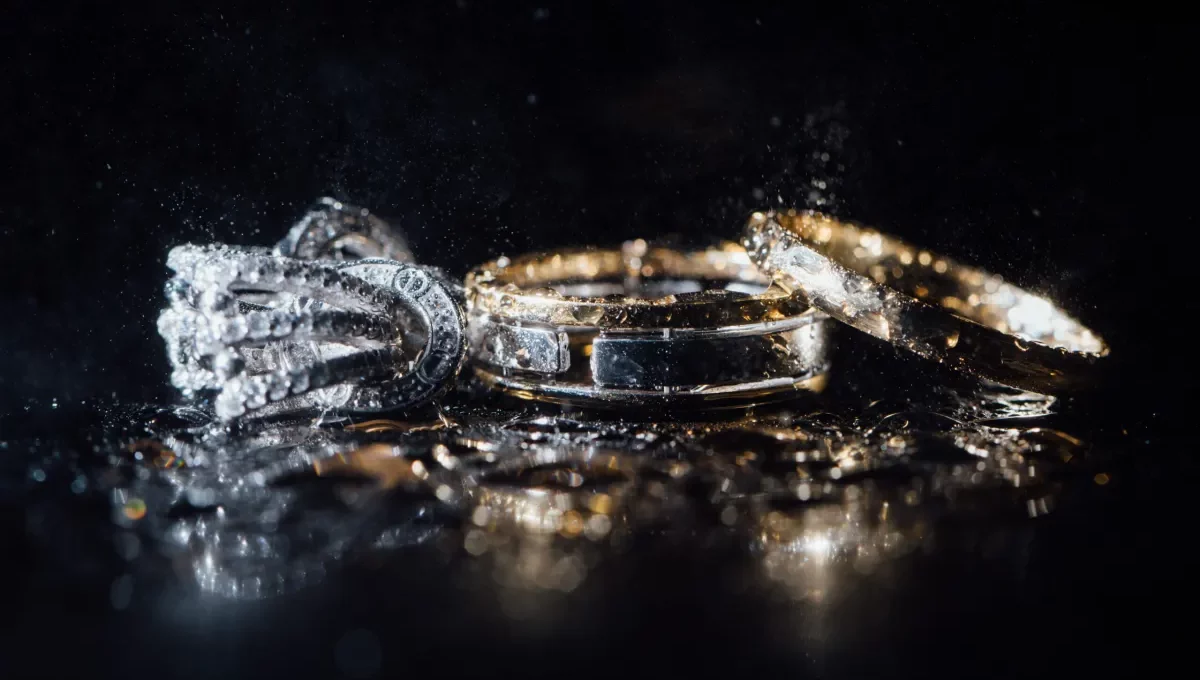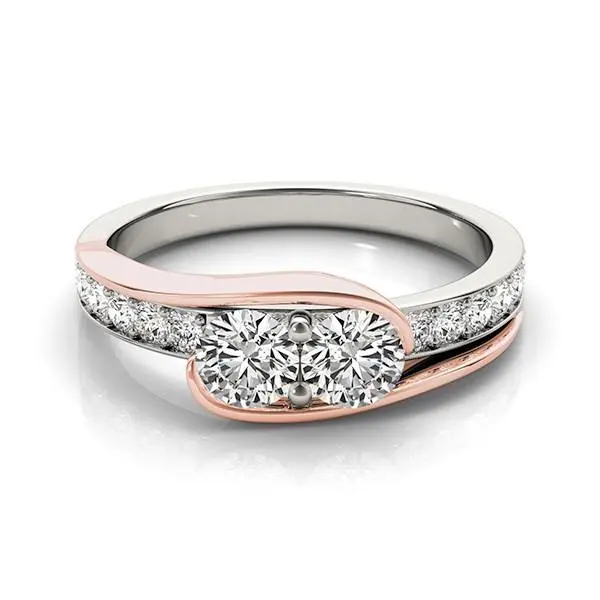
“Can you get gold jewelry wet?” is a common question, especially with summer right around the corner. Knowing when and where to wear gold is ideal when you invest a pretty penny into a new item for your collection.
There are a few important considerations when knowing whether you can get gold jewelry wet. First, you’ll need to think about the type of water (saltwater, chlorinated water, fresh, and more) and how long it’ll be submerged. In this guide, we’ll go over when you can get jewelry wet and how to keep your precious metals protected.
Can You Get Gold Jewelry Wet?
In general, wearing solid gold jewelry in water is safe, especially if you’re just in freshwater. However, extended exposure to water can also affect the yellow gold alloys, especially if they are regularly exposed to chlorine. You shouldn’t worry if your gold jewelry touches water a few times in its life.
Let’s take a deeper look at situations where you should keep your precious jewelry safe at home.
Swimming in Pools
Chlorine can be a disastrous compound to expose gold to, especially if it’s gold plated and not solid. The unique metal alloys in gold are susceptible to chemicals, especially chlorine in pool water. This is important to consider when swimming in a pool or hot tub as it can cause the alloys to begin dissolving.
It’s also important to note that if your gold pieces have any stones, chlorine can also affect them. You’ll begin to notice a stone and metal dullness that could be irreversible. The more you expose gold to chlorine, the duller it becomes, eliminating protective coatings.
At the end of the day, it’s best to leave your gold jewelry at home if you know you’ll be swimming or relaxing in a hot tub. One or two accidental exposures to chlorine won’t make much difference if you rinse it with tap water afterward.
Swimming in the Ocean
If you live close to an ocean or are going on vacation, it might be tempting to wear your jewelry in the water. Although saltwater is different than chlorinated pool water because it’s less harsh, it’s still not ideal for gold. Saltwater has a unique corrosiveness that falls between fresh and chlorinated water.
You have a little more leeway with the ocean than you would with a pool. In fact, you should be more concerned about losing your jewelry in the ocean than ruining it. After swimming in saltwater, a quick rinse with plain water should help keep your gold protected.
Continual exposure to saltwater can cause significant damage to your gold jewelry, like a pool. You’ll begin to notice the polished surface will dull over time. Also, it can cause significant salt buildup in any crevices in your ring.
Showering and Bathing
The last area you’ll likely expose your gold jewelry to water is when showering or bathing. Fortunately, the high-quality nature of solid gold is quite resistant to traditional tap water. Remember, the largest issue with pools and oceans is the corrosiveness of harsh chemicals and salt to the top layer of gold.
When you’re showering, you’re exposing your ring to minute chlorinated water, if any at all. Also, the only cleaners the metal comes near are your shower gels and shampoo. Showering, washing dishes, and bathing aren’t likely to damage your gold accessories.
Other metals typically considered safe for showering include silver jewelry, gold, platinum jewelry, stainless steel, titanium, and palladium. On the other hand, copper, bronze, and brass should be kept away from water, as it can cause your skin to turn green.
Can You Get Gold Plated Jewelry Wet?
Now that you have a clear idea of how it’s safe to wear solid gold jewelry in most types of water, let’s consider gold plating. Also referred to as gold polished jewelry, gold plated jewelry has considerably less resistance than sold gold. It’s best to leave these pieces out of the water, whether chlorinated water or freshwater, as the top layer of gold is delicate.

With a plated piece of jewelry, you have a thin coating of gold material on top of the base metal core. If there’s a single scratch on the surface of plated jewelry, its surface integrity is compromised, and the base metal can get damaged. As a result, you might begin to notice flaking of the gold coating or the base metal tarnishing.
Tarnishing can also be a concern for other metal types, such as sterling silver jewelry. Without proper care, sterling silver jewelry can tarnish as quickly as 14k gold plated pieces. It’s best to keep these items away from corrosive chemicals and not submerge them for long periods.
How To Care for Wet Gold Jewelry?
If you’ve made your gold jewelry wet, there’s no cause for panic, considering it’s a highly durable material. With that said, getting it as dry as possible is the best way to prevent long-term damage. There are a few quick tips that you can use to keep your pieces in their best possible condition for longer.
Tip 1: Use a Soft Cloth
When caring for wet gold jewelry, using soft polishing cloths is your best bet for the gold layer. These cloths are made from incredibly delicate materials that don’t cause scratches over time. If your jewelry gets wet, using a highly absorbent soft cloth can buff the solid layer clean while also getting rid of extra moisture.
Aside from caring for wet jewelry, you should always have a soft polishing cloth. It can help maintain silver, gold, white gold, and other types of metal.
Tip 2: Air Dry Before Wearing
Another essential tip for maintaining wet custom jewelry is to air dry completely before wearing it. Doing so can prevent body oils from being transferred into the crevices of the piece. Also, it helps to ensure all of the water evaporates before being put back on your wrist, neck, or piercings.
Tip 3: Always Rinse After Wearing
If you’ve accidentally worn your alloy jewelry into a pool or ocean, ensure you thoroughly rinse it before wearing it. Using freshwater is your best option, as it can help get rid of trapped salt and chemicals. After rinsing, you can air-dry the piece or use a jewelry polishing cloth to dry it.
Gold Jewelry and Water
“Can you get gold jewelry wet?” is a common question asked by accessory lovers worldwide. You’ll be glad to know solid gold withstands chlorine, saltwater, and fresh water in small doses as such a resilient metal. With proper maintenance, you can ensure your pieces stay in their best condition for much longer.





